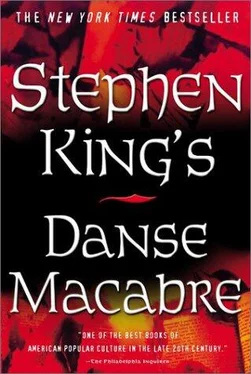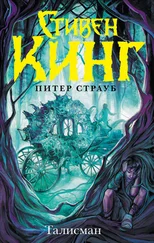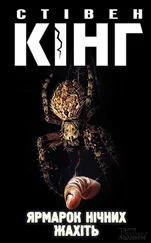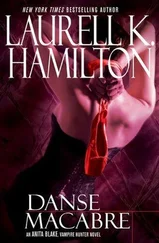A future filled with the PIONEER SPIRIT; even better, a future filled with the AMERICAN PIONEER SPIRIT. See, for example, the cover of the original Bantam paperback edition of Ray Bradbury's Martian Chronicles . In this artistic vision-a figment of the artist's imagination and not of Bradbury's; there is nothing so ethnocentric or downright silly in this classic melding of science fiction and fantasy-the landing space travelers look a great deal like gyrenes storming up the beach at Saipan or Tarawa. It's a rocket instead of an LST in the background, true, but their jut-jawed, automatic-brandishing commander might have stepped right out of a John Wayne movie: "Come on, you suckers, do you want to live forever? Where's your PIONEER SPIRIT?” This was the cradle of elementary political theory and technological dreamwork in which I and a great many other war babies were rocked untiI that day in October, when the cradle was rudely upended and all of us fell out. For me, it was the end of the sweet dream . . . and the beginning of the nightmare.
The children grasped the implication of what the Russians had done as well and as quickly as anyone else-certainly as fast as the politicians who were falling all over themselves to cut the good lumber out of this nasty deadfall. The big bombers that had smashed Berlin and Hamburg in World War II were even then, in 1957, becoming obsolete. A new and ominous abbreviation had come into the working vocabulary of terror: ICBM. The ICBMS, we understood, were only the German V-rockets grown up. They would carry enormous payloads of nuclear death and destruction, and if the Russkies tried anything funny, we would simply blow them right off the face of the earth. Watch out, Moscow!
Here comes a big, hot dose of the PIONEER SPIRIT for you, you turkeys!
Except that somehow, incredibly, the Russians were looking pretty good in the old ICBM department themselves. After all, ICBMs were only big rockets, and the Commies certainly hadn't lofted Sputnik I into orbit with a potato masher.
And in that context, the movie began again in Stratford, with the ominous, warbling voices of the saucerians echoing everywhere: " Look to your skies . . . a warning will come from your skies . . . look to your skies . . .”
5
This book is intended to be an informal overview of where the horror genre has been over the last thirty years, and not an autobiography of yours truly. The autobiography of a father, writer, and ex-high school teacher would make dull reading indeed. I am a writer by trade, which means that the most interesting things that have happened to me have happened in my dreams.
But because I am a horror novelist and also a child of my times, and because I believe that horror does not horrify unless the reader or viewer has been personally touched, you will find the autobiographical element constantly creeping in. Horror in real life is an emotion that one grapples with-as I grappled with the realization that the Russians had beaten us into space-all alone. It is a combat waged in the secret recesses of the heart.
I believe that we are all ultimately alone and that any deep and lasting human contact is nothing more nor less than a necessary illusion-but at least the feelings which we think of as "positive" and "constructive" are a reaching-out, an effort to make contact and establish some sort of communication. Feelings of love and kindness, the ability to care and empathize, are all we know of the light. They are efforts to link and integrate; they are the emotions which brings us together, if not in fact then at least in a comforting illusion that makes the burden of mortality a little easier to bear.
Horror, terror, fear, panic: these are the emotions which drive wedges between us, split us off from the crowd, and make us alone. It is paradoxical that feelings and emotions we associate with the "mob instinct" should do this, but crowds are lonely places to be, we're told, a fellowship with no love in it. The melodies of the horror tale are simple and repetitive, and they are melodies of disestablishment and disintegration. . . but another paradox is that the ritual outletting of these emotions seems to bring things back to a more stable and constructive state again. Ask any psychiatrist what his patient is doing when he lies there on the couch and talks about what keeps him awake and what he sees in his dreams. What do you see when you turn out the light? the Beatles asked; their answer: I can't tell you, but I know that it's mine.
The genre we're talking about, whether it be in terms of books, film, or TV, is really all one: make-believe horrors. And one of the questions that frequently comes up, asked by people who have grasped the paradox (but perhaps not fully articulated it in their own minds) is: Why do you want to make up horrible things when there is so much real horror in the world?
The answer seems to be that we make up horrors to help us cope with the real ones. With the endless inventiveness of humankind, we grasp the very elements which are so divisive and destructive and try to turn them into tools-to dismantle themselves. The term catharsis is as old as Greek drama, and it has been used rather too glibly by some practitioners in my field to justify what they do, but it still has its limited uses here. The dream of horror is in itself an out-letting and a lancing . . . and it may well be that the mass-media dream of horror can sometimes become a nationwide analyst's couch.
So, for the final time before we push on, October of 1957; Now, absurd as it looks on the face of it, Earth vs. the Flying Saucers has become a symbolic political statement. Below its pulpy invaders-from-space storyline, it becomes a preview of the ultimate war. Those greedy, twisted old monsters piloting the saucers are really the Russians; the destruction of the Washington Monument, the Capitol dome, and the Supreme Court-all rendered with graphic, eerie believability by Harry Hausen's stop-motion effects-becomes nothing less than the destruction one would logically expect when the A-bombs finally fly.
And then the end of the movie comes. The last saucer has been shot down by Hugh Marlowe's secret weapon, an ultrasonic gun that interrupts the electromagnetic drive of the flying saucers, or some sort of similar agreeable foolishness. Loudspeakers blare from every Washington street corner, seemingly: " The present danger . . . is over. The present danger . . . is over. The present danger is over ." The camera shows us clear skies. The evil old monsters with Heir frozen snarls and their twisted-root faces have been vanquished. We cut to a California beach, magically deserted except for Hugh Marlowe and his new wife (who is, of course, the daughter of the Crusty Old Military Man Who Died For His Country); they are on their honeymoon.
"Russ," she ask him, "will they ever come back?” Marlowe looks sagely up at the sky, then back at his wife. "Not on such a pretty day," he say comfortingly. "And not to such a nice world.” They run hand in hand into the surf, and the end credits roll.
For a moment-just for a moment-the paradoxical trick has worked. We have taken horror in hand and used it to destroy itself, a trick akin to pulling one's self up by one's own bootstraps. For a little while the deeper fear-the reality of the Russian Sputnik and what it means-has been excised.
It will grow back again, but that is for later. For now, the worst has been faced and it wasn't so bad after all. There was that magic moment of reintegration and safety at the end, that same feeling that comes when the roller coaster stops at the end of its run and you get off with your best girl, both of you whole and unhurt.
I believe it's this feeling of reintegration, arising from a field specializing in death, fear, and monstrosity, that make the danse macabre so rewarding and magical . . . that, and the boundless ability of the human imagination to create endless dreamworlds and then put them to work. It is a world which a fine poet such as Anne Sexton was able to use to "write herself sane." From her poems expressing and delineating her descent into the maelstrom of insanity, her own ability to cope with the world eventually returned, at least for awhile . . . and perhaps others have been able to use her poems in their turn. This is not to suggest that writing must be justified on the basis of its usefulness; to simply delight the reader is enough, isn't it?
Читать дальше










